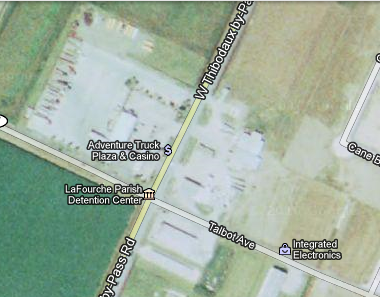Google map of Lafourche, Louisiana Detention Center now holding Andres Robles
A week ago Monday, August 21, Andres Robles, a 22 year-old US citizen who was unlawfully deported in 2008, finally received a card from the U.S. consulate in Matamoros, Mexico authorizing his return to his home in the United States. On Tuesday, Andres' father and mother made another 12 hour drive back to their home in Louisiana, through the Brownsville crossing in Texas.
At least this time, Andres was in the car with them.
On Wednesday DHS negligence led to his arrest and notice of a still active deportation order.
THIBODEUX AND DHS: THE PERFECT STORM
First thing Wednesday morning, the day after Andres returned home, his sister Maria, 26, took him to the Thibodeux Courthouse to clear up a warrant that had been issued for his arrest for not showing up to meet his probation officer, due to his being deported and living with his grandmother in Zacatecas.
The warrant had come to Maria's attention when she was picking up his criminal file from the court house for Lawrence Fabacher, Andres' immigration attorney, last December.
"We are good citizens, so we go over there to try to get them to clear this up," Maria told me today. They checked in and waited.
Around 1:30 pm, the police came over to where they were waiting. Instead of the court staff preparing paperwork to eliminate the warrant based on Andres' wrongful deportation, they called the police to arrest him. "They don't ask him anything. They just cuff him and send him to jail. They just say, 'Mr. Robles, we have a warrant for your arrest.'" Then they took him to the Lafourche Parish jail, where he remains with a $55,000 bond and, yes, a notice of the intent to remove him because of his active deportation order.
"I don't know what to say. I don't know what to think. It's really crazy. Is he ever going to get to enjoy his life?" Maria said. She also feels responsible for this. "I've never been so scared to go home in my life. I had to give this news to my parents and they looked at me like, you never should have brought him there. I felt it was my fault, for trying to make everything straight. They looked at me like, why did you ever open your mouth."
Of course the scenario that unfolded can be laid directly at the doorstep of DHS attorneys at the Oakdale Detention Center, who have been on notice and received documentation from Andres' attorney and myself about his wrongful deportation for over two months. The minute they received a copy of the June 15, 2011 letter from USCIS New Orleans Field Office Director Jonathan Crawford stating that Andres Robles derived his U.S. citizenship in 2002, they should have been filing a) a motion to terminate the proceedings ICE initiated against Andres; and b) a motion to rescind and vacate the 2008 deportation order.
These are the motions that DHS filed within days of the return of Mark Lyttle in April 2009, someone who also had been wrongfully deported. What does it tell us about the rule of law under the Obama administration that DHS is showing zero improvement in its protection of the civil rights of young men who appear to be of Mexican descent? This scenario is especially outrageous because of the personal contacts about this case by Larry Fabacher and myself.
On July 21, I wrote to Ernestine Fobbs in Washington, DC and attached the USCIS letter, and I asked about the steps ICE was taking to rectify its error:
Can you please tell me the steps that ICE has taken to assist Mr. Robles in his return to the United States following repeated inquiries on his behalf to the ICE office in Oakdale, Louisiana by his attorney Lawrence Fabacher?I also made a phone inquiry asking the same question of Temple Black, ICE spokesperson for Louisiana, who told me that Ernestine Fobbs was my contact person.
Not surprisingly, no one responded.
In Andres Robles' case, DHS attorneys at the highest levels know they screwed up--information I have on background--but, unlike their response to Mark Lyttle's case in 2009, DHS in Oakdale refuses to do anything to fix their demonstrable error.
Maria said that when the police approached with the handcuffs, Andres "looked like he was in shock, like he wanted to cry." The first time she'll be able to speak with him since the arrest will be on Saturday between 9 and 10 a.m. the one hour per week the Lafourche County jail allows Andres for 15 minute visits with his family members.
